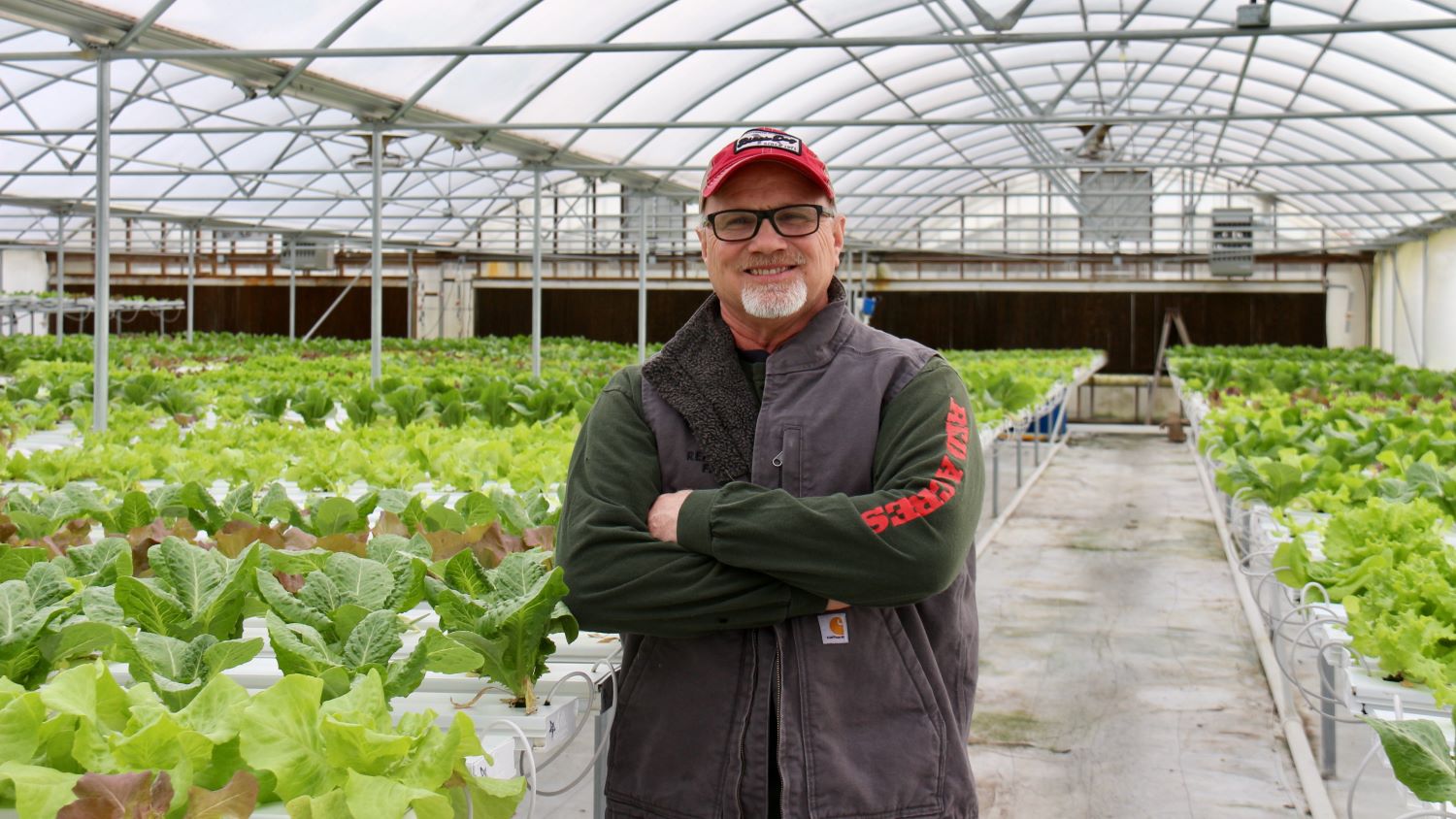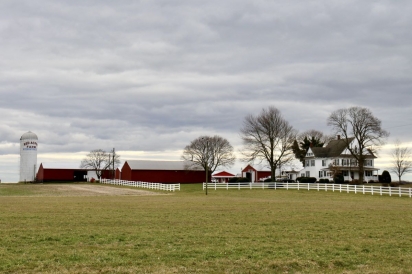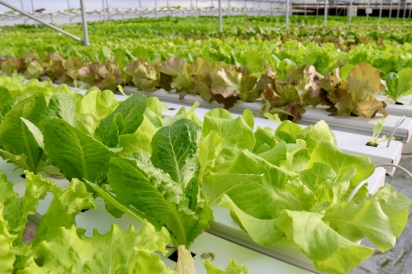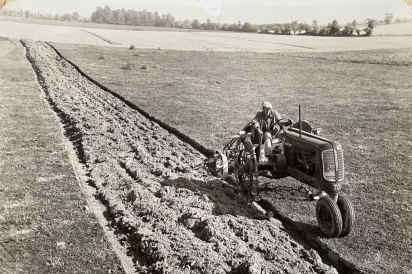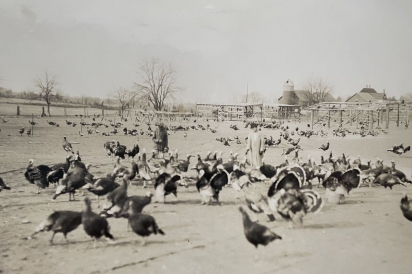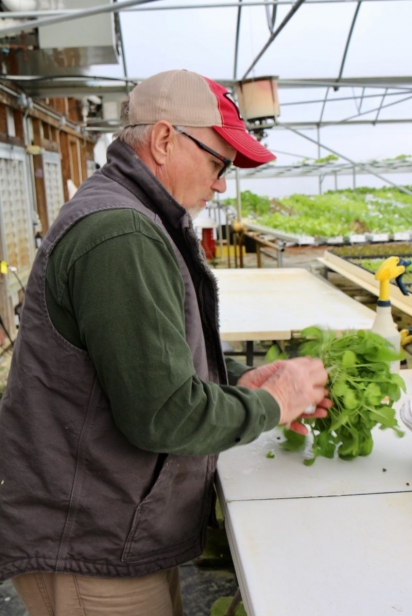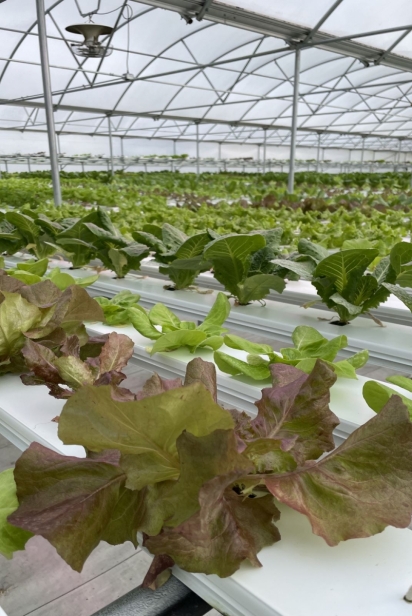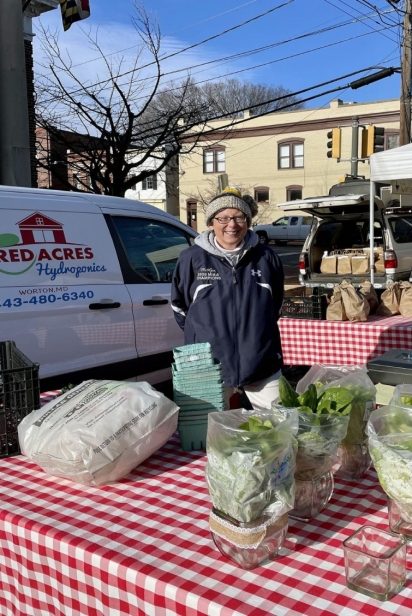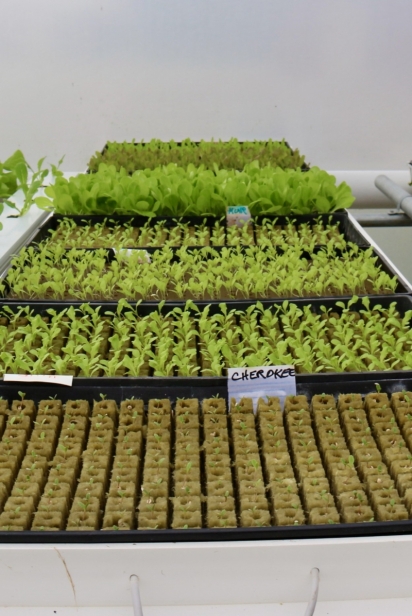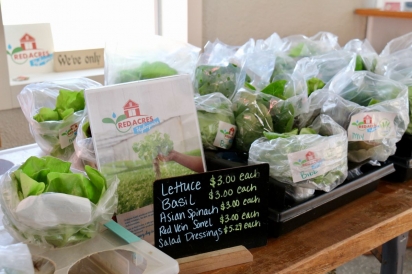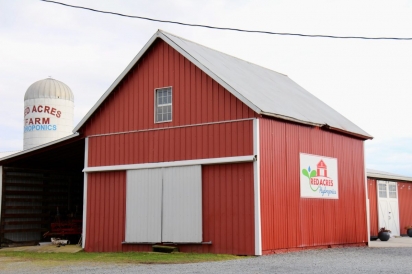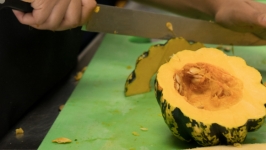Family, Legacy and Lettuce at Red Acres Hydroponics
It’s the gray, bitter end of January when I pull up the drive to Red Acres in Kent County, Maryland, but the bright red farm outbuildings and gleaming white farmhouse are as tidy and cheerful as ever. Stepping into Bryan Williams’ hoop houses feels like transitioning from black-and-white Kansas to technicolor Oz. Warmth! Sunlight! The smell of growing things! And everywhere, the jewel-like leaves of lettuces.
The greens from Red Acres Hydroponics seem to be on the menu at every mid-Shore restaurant worth frequenting these days, and it’s easy to see why. The plants are vibrant and vigorous, growing in an immaculate hothouse without a pesticide in sight. Williams invites me to taste one of his microgreens, an arugula. The flavor is peppery and bracing.
Today, Red Acres provides an uber-local yin to the yang of California-produced bulk lettuces. Established in 2015 on a fifth-generation Kent County farm, Williams took a leap of faith when he started a hydroponics operation on what had been until recently dairy and traditional ag land.
“I went to a presentation at Kent County High School’s ag program,” Williams said. (Red Acres is neighbors with the school, and Williams is such a booster he painted “Go Trojans!” on his silo overlooking the football field.) The high school students had an open house with a display about hydroponics, and it got Williams thinking. Williams had taken over the farm after his father, a lifelong dairy farmer, passed away in 2014. Small dairy operations weren’t financially sustainable anymore, and Williams wasn’t interested in doubling down. The hydroponics concept intrigued him—and after a lot of research and long conversations with his mother, Sis, who would be his partner in the venture—he decided to go for it.
“Sometimes it scares me now, thinking about what I did and how little I knew at the time,” Williams says. But he wasn’t afraid of working hard, and more than anything he was willing to experiment if it meant keeping the farm going. Red Acres was more than home—it was a family legacy. Williams had started helping out at seven as a paid employee.
“My grandfather asked me if I could pick up a bucket,” Williams said. “I said I could. So after that, I started using that bucket to feed calves every day. I got paid $5 a week—I’ll never forget him opening his wallet and peeling off five dollar bills, cash. That was my paycheck.”
Williams’ family had long been open to new ideas and figuring out ways that their land could work better, smarter. “To keep the farm going, they’d farm crops, cows, turnips, turkeys, vegetables. At one point we had 11 acres of asparagus, later, we had nine acres of tomatoes. We’d hire folks to pick them and then we’d ship across the Bay to Baltimore.”
The Williams men weren’t the only people in the family dreaming up new ways to drum up business. Williams’ great grandmother Clara, known as Caddy—who Williams describes as tall and intimidating, but also fair and hardworking—started a poultry operation on the farm. Raising and shipping turkeys across the country at the height of the Depression, she hired local labor from nearby Butlertown and hatched a solution for cold storage pre-refrigeration (open windows in her parlor to let the cool November air in). Photos from the period show an impressive flock, and in the distant background, a tall silo.
Today that same silo is painted with the Red Acres Hydroponics logo, visible for miles around. It’s a perfect symbol for Red Acres—a 100-year-old silo on a 5th generation farm where experimentation and industriousness are family traits. Williams walks me over from the room where he starts his lettuce seed over to the new climate-controlled hoop houses. As we step out of the cold into the warm humidity, he laughs at the risks he took getting the hydroponics business off the ground. “I researched it, I did a lot of homework, and I priced stuff. Sis gave me the green light. I had a vision, and we were going for it. Only catch is, I started my first batch of seed without a single buyer!”
Williams felt sure that restaurants would soon sign up once they saw the product—clean, tender lettuce that was relentlessly fresh. He grew some, harvested it, and that same day took it to two local Kent County chef/restaurateurs who became his first clients.
“Once we figured out the hydroponics growing system, then we had to tackle everything else,” Williams said. “How do we market it? What’s our delivery system? There was a lot of trial and error. But it turned out to be a pretty good investment without one guaranteed sale of a single head.”
Williams’ bet on hydroponics was a savvy one that allowed full environmental control over a crop that is notoriously vulnerable to shifts in rainfall and temperature. “Just look at what’s happening out in California,” Williams says. “There’s way too much rain, lettuce is rotting the fields, getting diseases. That’s part of farming—that’s mother nature. But by growing in a controlled environment, I can have lettuce year-round, picked that morning, with no preservatives and no waste, roots still on them that are alive.” The lettuces are also pesticide free, with Williams opening boxes of live ladybugs in the hothouses to provide natural aphid control.
Williams starts all of his seeds in rockwool in a sunny window. Once the seeds “crack” or begin to sprout, he transfers them to the greenhouses. Once the seedlings get to three inches, he switches to the long hydroponic trays where nutrients, moisture and temperatures are kept consistent until the plants reach market size. The entire space runs off a computerized control panel in the entryway that Williams calls “the brain.” It’s a high-tech, closely monitored process totally devoid of soil. In fact, the hothouses are, like the rest of the farm, scrupulously spic and span. From this optimized growing environment, plants are harvested continuously, and reseeding happens every day.
For all of this scientific wizardry in the hoop house, Williams’ ordering process is pretty old school. His cell phone buzzes and he shows me the screen—a text from a client, Happy Chicken, reordering for the next day. Williams sends back a green check text in response. “Now they know I’ve got it and I’ll take care of it,” Williams said. To re-order, all of his restaurants or wholesale buyers have to send their orders the night before delivery. Lettuces are harvested and delivered the same day.
Williams acknowledges this can be a challenge for chefs used to the set-it-and-forget-it ordering process with distributors like Sysco but, clearly, his lettuces are worth the extra effort. Eight years along and Williams has customers in Maryland’s Talbot, Queen Anne’s, Cecil, Caroline, and Kent Counties. He rattles off names of places he sells to—The Inn at Perry Cabin, Clayton Farms, the Tidewater Inn, Cross Street Market, Watershed. His lettuce is even served in two school systems—Kent and Caroline. Bottom line, if you’ve had a delicious meal in the last few years anywhere in the mid-Shore, you’ve likely enjoyed some Red Acres lettuce.
Growing his wholesale clientele isn’t enough for the enterprising Williams, who is always tinkering with his model. Williams has started selling at the Chestertown Farmer’s Market in the last few years, offering marketgoers pristine heads of lettuce and his coveted, seasonal “picnic mix”—lettuce leaves picked from summer plants to prevent them from bolting. Produce is on offer too, as Williams hit on a way to make his delivery trucks profitable going each way by hauling potatoes, tomatoes, you name it, from lettuce drop offs at Clayton Farms. He’s even tried internships with high school students through organizations like the Lion’s Club. Each initiative seems to have turned out the way that first crop of lettuce did—successfully.
Williams chalks it up to sticking with the same approach that worked for his family. “I try to treat people right,” Williams said. “And I have always remembered how hard my grandfather and dad worked. There was nothing easy about their lives, and this hasn’t been easy either. But I take pride in taking care of things. Red Acres has my name on it, and theirs too.”
Williams hopes that someday one of his children, Rachel or Bryan (“B” for short), will be able to say the same thing. They both inherited the Williams family work ethic, working to pull lettuces for the market, pitching in on weekends, and helping out with Williams’ newest venture, parties and events. (Like everything Williams turns his hand to, business is growing there, too. Farmhouse-style venues are all the rage, and Red Acres’ bucolic beauty and rustic charm comes by it honestly.) Williams considers himself lucky that his family is his team.
“I couldn’t have done any of this without Sis, my mom,” Williams says. “And Rachel and her husband and B are all here with these events. Even my nieces and nephews will come and pitch in.” At the end of the day, this is a family farm, and it’s those moments when everyone is there, working together that Williams feels his father would be most proud of him.
Like his dad, Williams admits that he’s a bit of a workaholic, but maybe that’s just the nature of farming whether cows or hydroponic lettuces. “I’ve always worked, and in a lot of ways I’m programmed to not take a vacation. I basically work eight days a week,” Williams said. “But I feel blessed because I’m doing what I like—I can’t imagine what it would be like to wake up and go to a job you totally hate.” He looks out over row after row of pert lettuces, startlingly green or flushing into burgundy. The opposite of a corporate cubicle, for sure, and not a bad place to call your office—or your legacy.
“I make it grow, that’s my job on our team,” Williams said. “I did it all to keep it going for them—the next generation.”
Red Acres Hydroponics
25367 Lambs Meadow Road, Worton, Maryland
(443) 480-6340
Facebook


